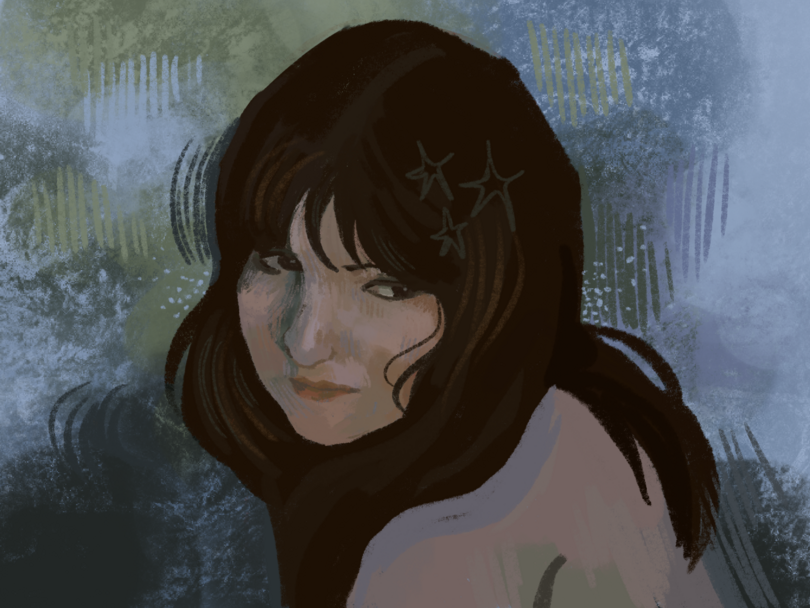‘Ace’ sees reinvented Madison Cunningham embark on life post-heartbreak

Full of heartbreak and inner turmoil, "Ace" is more raw and transformative than Cunningham's previous works, our columnist says. The album focuses on self-love and growth out of loss. Hannah Mesa | Illustration Editor
Get the latest Syracuse news delivered right to your inbox.
Subscribe to our newsletter here.
“When did war become sensible, and love unfair?”
This line from Madison Cunningham’s “Who Are You Now” struck me the first time I heard it last summer. The song’s intricate guitar riffs and intimate songwriting drew me into her Grammy-winning discography.
So, understandably, I was excited for her third studio album this fall. I wasn’t disappointed, and this lyric encapsulates a feeling of betrayal so integral to the album’s creation.
Cunningham released “Ace” on Oct. 14, a 14-song collection that captures the grief and truth in the aftermath of divorce. With distinctive interplay between her voice and guitar, the album leads the listener deeper into Cunningham’s vulnerability.
Full of heartbreak and inner turmoil, piano is a centerpiece to the album, alongside the guitar. Elegant piano melodies express Cunningham’s complex process of forgiveness for others and herself.
“Ace” relies more on these somber piano notes and less on the singer-songwriter’s usual catchy guitar melodies. The push and pull between the two instruments, in tandem with velvety woodwinds, is felt in the tracks, mirroring the highs and lows of post-breakup life.
Compared to her sophomore album “Revealer,” Cunningham’s new music is raw, transformative and even haunting, teetering on the edge of sounding like an entirely new artist.
However, it’s exactly this vulnerability that makes “Ace” a sensible self-love album in a world sometimes unfairly focused on external love.
The first track, “Shatter Into Form I,” serves as a purely instrumental transition into the album. Cunningham showcases her new identity as a pianist, playing her keys in a gentle manner that increasingly grows more ruminative, crescendoing before softening in the final moments.
The piano smooths out just in time to seamlessly transition into “Shore,” a song that details nostalgia for a lover who Cunningham says, “lives in the fabric of my mind.” The artist presents the evolution from nostalgia to haunting memory with the repetition of lines throughout the song.
Repeated lyrics such as “There’s only so much I can do” serve to convey longing, and are replaced by the much more determined, “This need I have to talk to you” at the end of the track.
Past the opening trio of songs that establish the divorce, the rest of the album carries the theme of rebuilding one’s identity. Introduced in “Skeletree,” the following songs teach listeners to overcome self-blame and fall in love once again.
The album’s first single, “My Full Name,” has a new soft piano foundation underscored by a cello. In thematic contrast, “Wake (feat. Fleet Foxes)” features Cunningham’s familiar guitar picking.
The song reflects the way she had tailored her identity to her ex-husband in the lyrics, “I have followed in your wake / In your image I might break.” The incorporation of both piano and guitar in later tracks expresses the combination of past values and new truths.
Unresolved anger lingers in “Mummy.” Analyzing her behaviors and expectations in childhood, she describes a cycle of hurt that seems to stem from unresolved trauma. With illusions to domestic violence, Cunningham recognizes both the hurt she received and the hurt she inflicted.
Cunningham expresses lasting emotional wounds in “Break the Jaw,” where she struggles to let go of her past and guilt. Her need for resolve carries over into “Invisible Chalk,” where she finds herself tied to her past, singing, “But I keep pushing that boulder / Uphill ‘til something moves / And I thought we were getting older / But you’re right where I left you.”
In “Take Two,” Cunningham says she’s afraid to fail. The first line, “You know I’m afraid to write a simple song,” sets the wistful tone for the rest of the song. Repetitive piano chords support her colorful illustrations of hesitantly wanting more out of life and her marriage, with strings and woodwinds crescendoing in the middle of the song.
Cunningham doesn’t want to give up in the face of pain. In a track aptly named “Goodwill,” she expresses her faithfulness.
“I heard you say that you loved me / And if there’s a chance you will / Well you know I’d be here still,” Cunningham sings.
The concluding song, “Best of Us,” is “the summit” for the metaphorical mountain Cunningham has been chronicling, where she rebuilds her self-worth by realizing that, “Maybe the rest of us are only good at breaking.”
It may take multiple listens to fully appreciate, but patience is integral to Cunningham’s journey in “Ace.” Her healing process makes it clear that Cunningham’s ever-present warm vocals and intricate lyrics are an evolving throughline. She’s willing to break internal, external and musical expectations in order to stumble and grow for the better.






